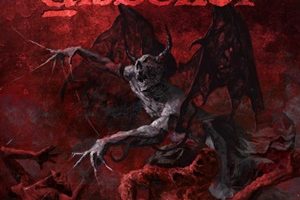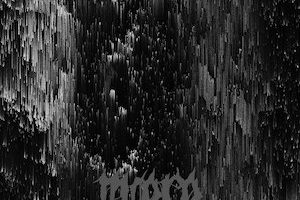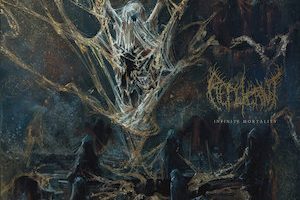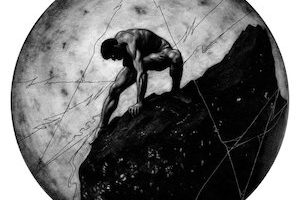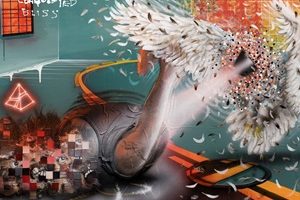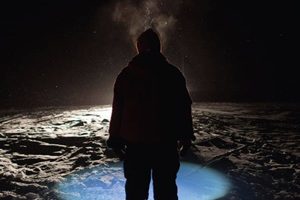Outergods – Enter the Catacombs of Madness
Thursday, 7th September 2023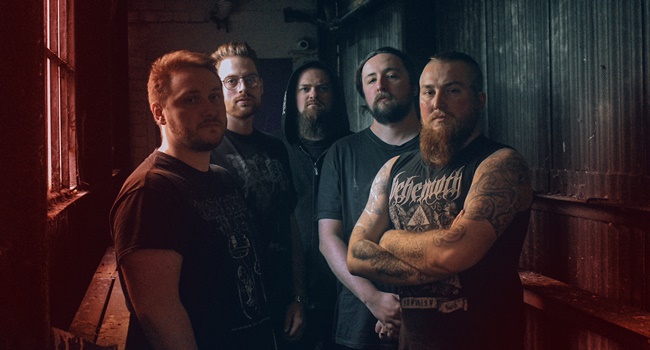
Photo: Tom Kelly
Beyond coverage of veteran acts, we at Dead Rhetoric do our best to provide insight into some of the latest bands that deserve more than a cursory glance. Hailing from the UK, Outergods quickly gained the attention of Prosthetic Records through their two initial singles released in 2021 – finally releasing their debut album with A Kingdom Built Upon the Wreckage of Heaven. Incorporating a mix of death metal, grindcore, and black metal with lots of influences across the 90’s, 2000’s and current marketplace, the material contains aggression, fury, and emotional resonance that the underground mavens treasure when it comes to this style. We spoke to multi-instrumentalist/songwriter Nathe Sinfield about his numerous influences, the life circumstances that fueled a lot of the lyrical themes, how the band will differ in the studio versus live, thoughts on the heavy costs of running a band in the UK currently, plus a little insight into the next album.
Dead Rhetoric: What do you remember most about your early childhood memories surrounding music – and at what point did you discover heavier forms of music plus wanting to pick up an instrument to develop your own material in bands?
Nathe Sinfield: I learned a lot about music through my dad – he was in a lot of bands when I was a kid. He naturally showed me music that he was into. My older brothers as well, they showed me a bit more of the shoegaze stuff during the 90’s, Manchester music, My Bloody Valentine and so forth. I started learning an instrument again thanks to my dad. He helped me to play the bass – I actually started with piano first, then the bass, and then I decided to try the guitar.
The heavier stuff, that was through another one of my brothers. He’s three years older than me. It started off with hard rock stuff and then nu-metal, Linkin Park, Korn, and then some more slightly experimental stuff like Pitchshifter. Then I went to stuff like Slipknot, Mudvayne. By the time I was like 13 I came across more extreme metal like Mortician, The Berzerker, Morbid Angel, things like that. It was a very quick process for me to move into the heavier stuff.
Dead Rhetoric: In the background notes for your debut album with Outergods – A Kingdom Built Upon the Wreckage of Heaven, your fellow vocalist Sam Fowler states that you wanted to make a feral beast of an album that would blend your favorite sounds and push them to the limits of extremity. What sources of influences/inspiration fueled that outlook, and do you believe you achieved what you desired on all fronts through this set of material?
Sinfield: Yeah, I think we achieved what we wanted to do. There’s always room to do even better, and we will try to push this and refine it with each record going forward. In terms of what we wanted to achieve at that time, in terms of myself there was some personal stuff going on with me and Sam, the circumstances kind of shaped what the album turned out to be. I have been getting better mental health-wise, I did come off of certain medications towards the back half of the recording of the album. Personal experiences shaped the album, and finding comfort in the nostalgia, based on the stuff that we listened to growing up.
Dead Rhetoric: Hopelessness, grief, and torment fuel the lyrical content throughout the record. Discuss the process of channeling these feelings of real experiences in these songs – do you believe it was a sort of cleansing or cathartic process that in the end helps yourselves (and the listeners) become better and stronger as people in the end?
Sinfield: Yeah, and that was more so me. I know that Sam has some things that he also went through, he didn’t want to delve too much into that. For me, my mother passed away just under a year ago now, and I was still writing part of the album at that point. I was dealing with these dark emotions, and I hadn’t dealt with a lot of it, so I was able to deal with this through some of the lyrics.
Dead Rhetoric: How did the cover art develop for this album? Was it a collaborative process between the band and the artist to achieve what we see for the final work?
Sinfield: Yes, we wanted to harken back to a 90’s aesthetic. We wanted to add a slightly cosmic element to it as well. That was done by my brother, it made sense to get him involved as well. I think he came to us with a rough idea based on the album title and what he thought would be cool. We chatted about things briefly and he started developing the concept out of it.
Dead Rhetoric: Do you think some of the longer song titles are going to be a trademark for Outergods as well?
Sinfield: I think so, yeah. We’ve always been bouncing around ideas for a few song titles here and there. We think it sounds cool and helps shape what the lyrics will be about. Sometimes Sam comes up with a title based on what he thinks the song could be about. It’s a combination of that and a throwback to some of the bands that we grew up listening to, Nile for instance was a band who would end up having awesome long song titles.
Dead Rhetoric: Where do you see the differences taking this material from the studio to the stage – as you’ve expanded the lineup to a quintet to deliver these songs properly in a live setting?
Sinfield: I think we will try to replicate the songs as best as possible from the recording when playing live. We take all the electronic elements and have that on tape as well. To have a synth player, I would have to hire someone else. We do those via samples, and the rest of the instrumentation with guitars, bass, drums, and vocals will all be done live. The drums may slightly vary compared to what you hear on the record.
Dead Rhetoric: What’s it like being a part of the Prosthetic Records roster – and what do you enjoy most about the staff and their approach to promoting the band globally?
Sinfield: I think they are great. I’ve always been a fan of the label since I came across New American Gospel from Lamb of God. Also, Gojira, and the band 1349 as well. I’ve been a fan of the bands that they’ve worked with. The fact that they were cool with signing such a fresh band like ourselves who had only had a single or two out, that was really cool. They’ve been incredibly supportive as well. They have a great PR department, Steve who we work with, has a wealth of knowledge. The fact that they have been able to get the coverage that we have based on this album, it’s incredible. The main thing we wanted to be able to do is to get our music heard by as many people as possible and see this album as a foundation that we can build upon. It’s a great starting point for us.
Dead Rhetoric: What do you consider some of the biggest challenges facing the band at this early point in your career?
Sinfield: Just personal things really. Both Sam and I have other things going on, I have two kids, we have jobs, trying to work around our day jobs, being a dad, and work on the music. We also have other bands going on, so we all try to work around this.
Dead Rhetoric: How do you view the state of the heavy music scene in your country versus the global outlook? What do you enjoy most about things, and what changes (if any) would you like to make for the greater good of the movement?
Sinfield: I’m not too sure. My blinders are sometimes up when it comes to the heavy music scene. There are a lot of toxic elements to it as well. Every week there seems to be something coming up about a band who has members that are troubled, and I don’t know where that really started. It can be pretty gatekeepy in some aspects of it. Aside from that, the massive thing to consider is all the costs to be under consideration to keep a band going. Especially within the UK, if they want to tour outside the country, it’s extremely expensive. I don’t know what the demands will be outside here to play live. I don’t know if we can afford to sink loads of money into it right away to travel, all the costs involved.
Dead Rhetoric: You mention in another recent interview your love/respect for Vogg of Decapitated, describing him as the Dimebag of death metal and a massive influence for Outergods. What do you enjoy most about the band, their work, and what are some highlights in your eyes – have you had the opportunity to take in the band live as well?
Sinfield: Yes, I’ve seen them live. He’s just a great songwriter, the way he structures songs and the ideas that he comes up with. He is very inspirational. The way he is able to lay out the songs, the way he puts in his melodies here and there, he’s a genius. He was able to push the genre in a really good direction.
Dead Rhetoric: What hobbies, passions, or interests do you have away from music that you like to pursue when you have the free time and energy to do so?
Sinfield: For me it’s mostly related to music. I like to play a lot of video games like Bloodborne, Dark Souls, those sorts of things.
Dead Rhetoric: What’s on the agenda for things related to Outergods over the next twelve months or so? Has work begun on the next record – and if so, how do you see the evolution in terms of songwriting/style shaping up?
Sinfield: We will play a few more shows – starting tomorrow. We have some other shows lined up to start the new year. I’ve already written about 90% of the next album, I’m just finishing up demoing that. We will look at recording that soon. This material is going to have the natural progression from the debut album. Maybe have some more additional layers as well. People who like our debut will be sure to like the next one we’ve got.











